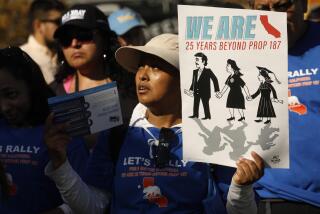This time, a silent minority
- Share via
Washington — IT WAS A SIGN. This city was uncharacteristically balmy last week, and L.A. was uncharacteristically frigid. Yet for some reason, it felt appropriate; although I had traveled almost 2,700 miles, it was for a conversation I should have been able to have in my hometown.
Last year’s discussion of immigration rights borrowed generously from the civil rights movement, but it had little space for a black position on immigration. (I don’t count the simplistic statements of lone-ranger community “leaders” who advocated closing the borders, or the naive activists who declared black and brown folk natural allies who need to stop squabbling over trifles like immigration.) So when the Center for Immigration Studies invited me to attend a symposium called “Black Americans and the Challenge of Immigration,” I accepted and looked forward to a more nuanced debate.
Of course, the center itself is hardly neutral; it claims to support immigrants but not U.S. immigration policy, and says it is concerned first with the “broad national interest” that it feels is ignored by the powers that be. This sounds reasonable, especially to blacks who’ve had no real spokesperson to articulate their stake and to address their frustrations with unchecked immigration.
But the symposium is also a potential minefield. Are our concerns being used to advance a larger agenda that ultimately doesn’t serve us? Is this another invitation to join another opportunistic but ultimately unhelpful coalition? I wanted to find out.
Daryl Scott, a professor of modern U.S. history at Howard University, discussed blacks and their long and tortured relationship to immigration. Blacks were always viewed more as aliens than as citizens, he said. The term “Great Migration” -- the 1920s exodus of blacks from the South to the North in search of work -- reinforced the idea that blacks were immigrants in their own country, uprooted and unwanted. They were not simply immigrants, he said, but internal aliens.
Black leaders in the late 19th and early 20th centuries had critiques of the effect of immigration on black employment, Scott said -- but many of those same leaders also supported immigration because it jibed with their beliefs in an open society for all and fair competition for blacks. Of course, U.S. employers supported immigration as well, but that was because they tended to prefer any labor pool but a black one.
The difference between then and now, Scott said, is that black leadership then wasn’t in denial about this. But when it joined the New Deal coalition and the Democratic Party, which supported open immigration, its voice was compromised. Scott believes in coalition politics, but “blacks aren’t senior partners in the coalition.”
George Borjas, a Harvard economist, made a point that was much appreciated in the room: It’s not that American natives don’t want the jobs that immigrants do, he said. It’s that they don’t want the jobs at the wages immigrants are currently paid. One participant stood up and made the million-dollar point: There’s a difference between legal and illegal immigration, and illegal immigration affects black people more, especially poor blacks who have the lowest rates of employment.
I nodded but didn’t applaud. Not because I disagreed but because it felt a little unseemly to cheer for dividing people so strictly into legal and illegal, especially coming from citizen-aliens like us. It occurred to me that blacks hold on to the rule of law not so much because they’re conservative or chauvinistic or nationalistic, but because laws are often the only thing standing between them and oblivion.
Frank Morris of Morgan State University and James Gimpel of the University of Maryland talked about the state of black political power, which is declining and not likely to reverse course, especially as Latinos remake black districts. Morris is incensed not about this remaking but about the deafening silence of blacks on so many matters vital to their survival. Blacks “have a dog in the fight” over immigration but aren’t acting like it, he said. Morris is angry that the black position is so unrepresented even where black political representation still exists.
I’m with Morris on this one -- I live it. I applauded. Here was an interest that was entirely ours.
I don’t know what the center will do with its latest data. But for one day, at least, it succeeded in gathering a lot of black people in one place to talk about a subject too little talked about.
More to Read
Sign up for Essential California
The most important California stories and recommendations in your inbox every morning.
You may occasionally receive promotional content from the Los Angeles Times.










